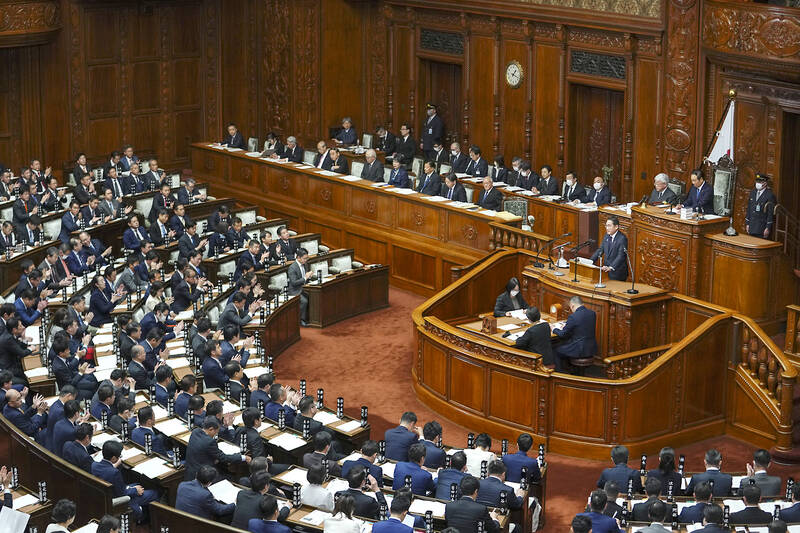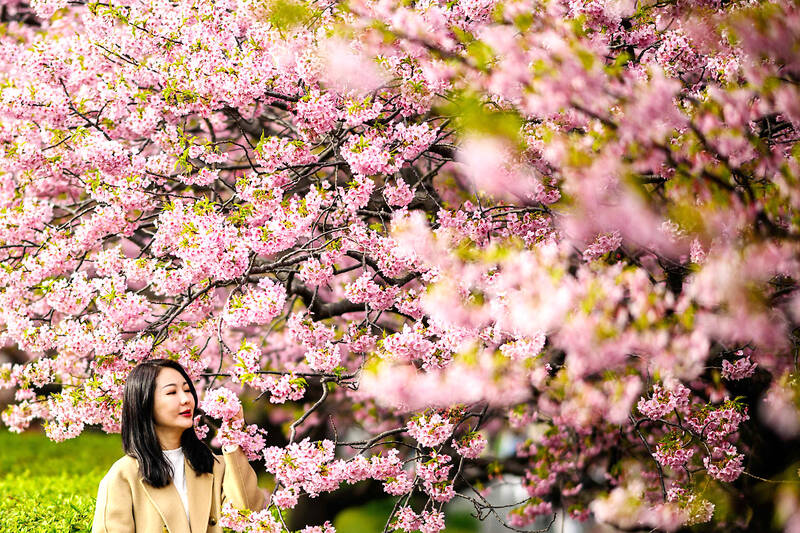For Akiko Saikawa, the administrative nightmare began soon after she married.
The office worker from Tokyo had to go through dozens of procedures to change her name on her passport and other documents, as well updating her social media accounts. All because she had been required, by law, to change her surname as a married woman.
Couples in Japan are free to choose which surname to take when they marry, but in 95 percent of cases, it is the woman who changes her name, often with reluctance.

Photo: EPA-EFE
“It was very time consuming and inconvenient,” Saikawa says. “But the most troublesome part was that my name on our family register changed to that of my husband. That means I have had to make it clear to employers that I want to continue being referred to by my maiden name at work.”
Now attention is turning to the archaic law that forbids married couples from using separate surnames, and the almost three decades of inaction after a government panel drew up proposals to change part of a civil code first adopted in the late 1800s.
Inconvenience aside, campaigners say the insistence on using the same surname is another sign of Japan’s lack of progress on gender equality.

Photo: AFP
Machiko Osawa, a professor and specialist in labor economics at Japan Women’s University, blames the lack of progress on “old-fashioned patriarchal attitudes” in the ruling Liberal Democratic Party (LDP) and among supreme court justices “who insist on supporting an antediluvian status quo.”
“Newlywed women have to waste so much time changing their names on banking accounts, credit cards, passports and all other official documents. And for those who have established themselves as professionals, being forced to change their name is a denial of what they have accomplished. It sows confusion and subordinates them to men,” Osawa says.
LOCKED OUT OF HOTEL ROOMS

Photo: AFP
After years of stalling, pressure is building on the LDP, not just from rights campaigners, but also senior business leaders who say the rule is proving an obstacle to Japanese firms that do business overseas.
Masahiko Uotani, chief executive of the cosmetics giant Shiseido, said he knew of female executives who had been locked out of hotel rooms or denied admission to meetings on overseas business trips because their ID didn’t match their surname.
“The current system is becoming a barrier to career development for those who are internationally active,” Uotani said at a meeting of the Japan Business Federation, a powerful lobby group, according to the Mainichi Shimbun.
The federation, known as Keidanren, has collected testimony from other professional women who have fallen foul of the single-name requirement. One said that having to change her last name “is ruining my career as the academic papers I’ve written under my maiden name are not being recognized,” according to the Mainichi. Another said: “In some cases, my business name has not been accepted when signing contracts.”
Now Keidanren has thrown its weight behind the campaign in a reflection of a shift in Japanese corporate culture. While almost 84 percent of companies allow women to keep their original surnames in the workplace, according to a 2022 survey by the Institute of Labor Administration, the extra documentation needed on overseas work trips continues to cause confusion.
“I want it to be implemented as a top priority to support women’s working styles,” Keidanren’s head, Masakazu Tokura, said recently, declaring himself “bewildered” by the lack of progress since the ministry panel made its recommendation in 1996.
While the government has allowed maiden names to appear alongside married names on passports, driving licences and residence certificates, Japan remains the only country in the world that requires spouses to use the same name.
UNDERMINING FAMILY UNITY?
Conservative LDP members argue that amending the civil code would amount to an assault on traditional values by “undermining” family unity and causing confusion among children.
Osawa, who is “not optimistic” that recent pressure will lead to a legal change, dismisses the family values argument as an “excuse for inaction.”
“Japan’s divorce rate is on a par with that of the UK and Germany, so the current law on names is not supporting family stability,” Osawa said. “Times have changed, and most households need a double income to make ends meet, so having a choice for couples to decide what name to go by makes sense, and it promotes gender equality.”
The prime minister, Fumio Kishida, has urged caution, claiming last year that “various opinions among the public” meant more discussion was needed to win “broad” support for the change.
Saikawa hopes other women do not have to navigate the bureaucratic maze she faced after marrying. “Having separate surnames would mean they would no longer have to alter their name dozens of times, reset their careers and rebuild the reputation they had established under their maiden name,” she says.
“And they would be able to cherish a name that represents their family’s history and is a part of their own identity.”

Cheng Ching-hsiang (鄭青祥) turned a small triangle of concrete jammed between two old shops into a cool little bar called 9dimension. In front of the shop, a steampunk-like structure was welded by himself to serve as a booth where he prepares cocktails. “Yancheng used to be just old people,” he says, “but now young people are coming and creating the New Yancheng.” Around the corner, Yu Hsiu-jao (饒毓琇), opened Tiny Cafe. True to its name, it is the size of a cupboard and serves cold-brewed coffee. “Small shops are so special and have personality,” she says, “people come to Yancheng to find such treasures.” She

Late last month Philippines Foreign Affairs Secretary Theresa Lazaro told the Philippine Senate that the nation has sufficient funds to evacuate the nearly 170,000 Filipino residents in Taiwan, 84 percent of whom are migrant workers, in the event of war. Agencies have been exploring evacuation scenarios since early this year, she said. She also observed that since the Philippines has only limited ships, the government is consulting security agencies for alternatives. Filipinos are a distant third in overall migrant worker population. Indonesia has over 248,000 workers, followed by roughly 240,000 Vietnamese. It should be noted that there are another 170,000

In July of 1995, a group of local DJs began posting an event flyer around Taipei. It was cheaply photocopied and nearly all in English, with a hand-drawn map on the back and, on the front, a big red hand print alongside one prominent line of text, “Finally… THE PARTY.” The map led to a remote floodplain in Taipei County (now New Taipei City) just across the Tamsui River from Taipei. The organizers got permission from no one. They just drove up in a blue Taiwanese pickup truck, set up a generator, two speakers, two turntables and a mixer. They

Hannah Liao (廖宸萱) recalls the harassment she experienced on dating apps, an experience that left her frightened and disgusted. “I’ve tried some voice-based dating apps,” the 30-year-old says. “Right away, some guys would say things like, ‘Wanna talk dirty?’ or ‘Wanna suck my d**k?’” she says. Liao’s story is not unique. Ministry of Health and Welfare statistics show a more than 50 percent rise in sexual assault cases related to online encounters over the past five years. In 2023 alone, women comprised 7,698 of the 9,413 reported victims. Faced with a dating landscape that can feel more predatory than promising, many in